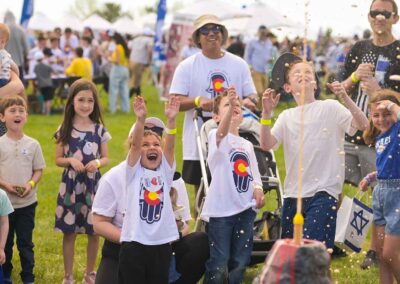Shabbat Shalom: A Message from Dan Leshem, Director of JCRC
Just this month, I moved with my family from Florida to Colorado to assume the role of Director of the Jewish Community Relations Council (JCRC) at JEWISHcolorado. Throughout my life’s journey–a child of Israelis born in Los Angeles who has since moved to New York, Georgia, North Carolina, Florida, and finally to Colorado–I have learned about separation, rebuilding, dispersal, and renewal. Our children are challenged by switching schools and camps so frequently. My wife and I through saying goodbye to so many friends and communities in which we have become enmeshed over the years. And yet, I don’t think any of us could imagine a different journey for our family. Each stop has shaped us. Each move was motivated by our desire to be closer to family, to do more important work, and to have greater opportunities for our children.
Narratives of dislocation and dispersal are very familiar to generations of Jews today who see contemporary antisemitism, commemorate the Shoah and mourn wars in Israel. This week’s Torah reading asks us to ponder the centrality of dislocation and dispersal to Jewish existence by the title given to the portion itself, Matot. This title refers to the 12 Israelite tribes who are described this week as Matot (sticks), rather than the more common term Shvatim (branches). While both terms mean tribes, the difference between a stick and a branch of a tree is that the latter is still connected to its roots and source while the former is cut off.
So, the obvious question is why this week do we see our ancestral Israelites as sticks rather than branches? It is no coincidence that we always read the portion of Matot during the season of the 9th of Av, Tisha B’av, the commemoration of the destruction of the first and second Temples in Jerusalem. This confluence of Matot and the season of Tisha B’av superimposes and highlights the notes of transformation and dispersal inherent in the tribal journey, the matot (tribes/sticks) that wandered in the dessert and would continue to wander after the loss of both temples led to Jewish exile and diaspora.
Our journeys–be they personal, communal or national–are not something to be mourned. As people who have been slaves, wanderers, strangers, and orphans, we know what it is like to yearn for home. And we know that pain will not destroy us just like selfishness will not save us. We can embrace the desire to fix the world around us by supporting those in our community who struggle to fulfill their needs, by amplifying the voices of those struggling to be heard, and by standing shoulder-to-shoulder with those needing friends and allies. While we wait to feel entirely whole – a community of branches not sticks – we can work to be wholly present for those who are closest to us and those who are still far away.
Dan Leshem
Director, Jewish Community Relations Council
Please email Dan Leshem at DLeshem@JEWISHcolorado.org with comments or questions.






